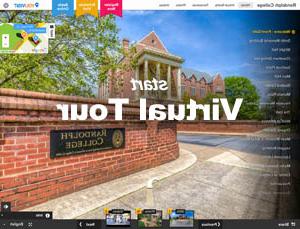Admission
Science & Art Saturdays
What’s it like to take a college class? Find out on Science + Art Saturdays this fall.
These labs, workshops and interactive tours are taught by Randolph College professors and professional experts from the Maier Museum of Art at Randolph College.
- All sessions are free and are open to all high school students.
- Each session starts at 10 a.m. and lasts about 2 hours.
- Space is limited.
- Registration for each session closes at noon the day before the session.
- Please note that each student needs to have their own email address in order to register. For example, if two siblings want to attend, then we need two different emails.
- Please call Alex Cole at 434.485.8038 if you have any questions about the registration process.
Science and Art Scholars Program
- Science: If you attend four or more Science sessions, you will be designated a Randolph College Science Scholar, and will receive a certificate.
- Art: If you attend both Art sessions (Sept. 7 and Oct. 5), you will be designated a Randolph College Art Scholar, and will receive a certificate.
Sign Up Now
Browse the course description list below. Click the “register” link for each session you wish to attend.Got questions? sciencesaturdays@ejly.net
Contemporary Wildlife Art
September 7, 2024 [ Register ]
Laura McManus, Curator of Education, Maier Museum of Art
Get a sneak peek at the Maier’s newest exhibition before it opens to the public! Animals of the natural world have inspired artists since time immemorial. “Vita Wild: Contemporary Wildlife Art” features nine contemporary artists whose work depicts animals in the American wilderness and their connection to ecosystems. The unique large-scale paintings with sculptural elements by Mark Messersmith will inspire your own mixed media works.
Wrapping, Folding, Geometry, and Topology
September 14, 2024 [ Register ]
Marc Ordower, Chair, Department of Mathematics and Computer Science
Come see what amazing things you can do with math!
Assume or Presume: The Use of Presumptive Testing in Forensic Chemistry
September 21, 2024 [ Register ]
Ann Fabirkiewicz, Charles A Dana Professor of Chemistry
Often in forensic work there is a need for a quick and simple test in the field to determine if a substance is a cause for concern (or arrest!). Using simple, over the counter medications as examples, we will look at the chemical basis for some tests, then use them in the lab to identify an unknown white powder.
Acoustic Levitation
September 28, 2024 [ Register ]
Jonathan Skelton, Assistant Professor of Engineering
Ever want to levitate something like a magician? In this course we will learn how sound waves can be controlled to make water droplets and small objects float in the air. We will dive into the physics of acoustics and then walk through how all of the electrical components work so that you can make your very own acoustic levitator at home.
Art and Protest
October 5, 2024 [ Register ]
Leslie Shipley, Associate Professor of Art History
Laura McManus, Curator of Education, Maier Museum of Art
The visual arts have played a vital role in movements for social change. Using examples from the Maier’s collection and beyond, we will investigate ways art is used as a tool for resistance. Then we will create protest art using the “photomontage” technique, a collage style invented by Dada artists of the early 20th century.
Robotics and Mechatronics with the Arduino
October 19, 2024 [ Register ]
Peter Sheldon, Professor of Physics & Engineering
Mechatronics engineering is the marriage of mechanical, electrical, and computer engineering, often used for robotics and manufacture engineering. We will learn the basic operation of the Arduino microcontroller, and use it to control lights, sounds, and motors, as time allows.
Eyes on the Sky: The why, when, and how of meteorological phenomena
October 26, 2024 [ Register ]
Karin Warren, Herzog Family Chair of Environmental Studies
Sky watchers know the view above our heads is filled with extraordinary things—rainbows and double rainbows, ice crystal haloes, aurorae, and clouds of astounding variety. We’ll explore some meteorology and physics behind a variety of atmospheric phenomena, and learn when, where, and how to keep our eyes on the skies to spot them.
Oysters and Water Quality
November 2, 2024 [ Register ]
Sarah Sojka, Associate Professor of Marine Science
In this lab activity, you will get to watch how oysters can improve water quality and design an experiment to test what affects how quickly oysters can clear the water.
Fitness Assessments: Flexibility, Balance, and Blood Pressure
November 9, 2024 [ Register ]
Carolyn Sarson, Associate Professor of Sport and Exercise Studies
We will do fitness assessments and discuss their meaning and importance.
The Science of Illusions
November 16, 2024 [ Register ]
Blair Gross, Associate Professor of Psychology
Have you ever wondered how your minds see and hear the world around us? In this class we will explore a variety of mind-blowing visual, auditory, and taste illusions that teach us the inner workings of how our perceptual systems construct our experiences of the world around us.
Protein Folding with Matlab
November 23, 2024 [ Register ]
Katrin Schenk, Associate Professor of Physics & Engineering
In this session we will learn a bit of Matlab programming to visualize real protein folding data!




